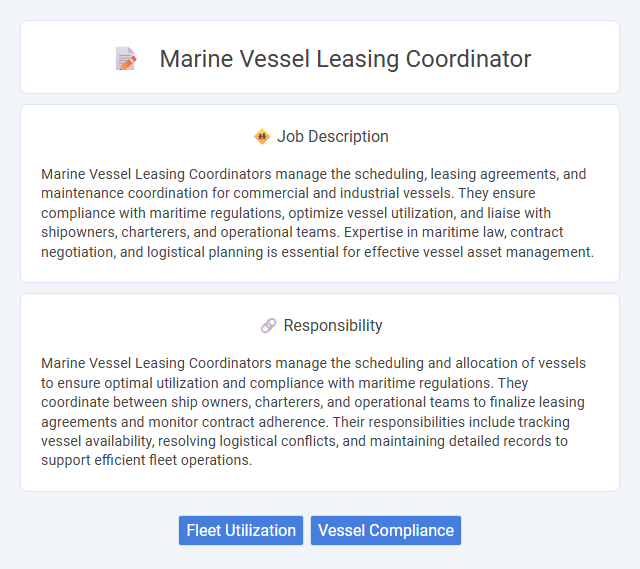
Marine Vessel Leasing Coordinators manage the scheduling, leasing agreements, and maintenance coordination for commercial and industrial vessels. They ensure compliance with maritime regulations, optimize vessel utilization, and liaise with shipowners, charterers, and operational teams. Expertise in maritime law, contract negotiation, and logistical planning is essential for effective vessel asset management.
Individuals with strong organizational skills, attention to detail, and the ability to manage multiple tasks simultaneously are likely to be well-suited for a Marine Vessel Leasing Coordinator role. Those who thrive in dynamic, fast-paced environments and possess effective communication skills may find greater success coordinating leasing agreements and vessel scheduling. Candidates who prefer routine or low-stress jobs might struggle to adapt to the demands and complexities of this position.
Qualification
Marine Vessel Leasing Coordinators must possess strong knowledge of maritime laws, vessel operations, and leasing contracts. Proficiency in contract negotiation, financial analysis, and project management is essential to ensure optimal fleet utilization and cost efficiency. Candidates typically require a bachelor's degree in marine transportation, business administration, or a related field, combined with experience in vessel chartering or maritime logistics.
Responsibility
Marine Vessel Leasing Coordinators manage the scheduling and allocation of vessels to ensure optimal utilization and compliance with maritime regulations. They coordinate between ship owners, charterers, and operational teams to finalize leasing agreements and monitor contract adherence. Their responsibilities include tracking vessel availability, resolving logistical conflicts, and maintaining detailed records to support efficient fleet operations.
Benefit
A Marine Vessel Leasing Coordinator likely gains significant benefits such as competitive compensation packages and opportunities for career growth in the maritime industry. There is a strong possibility of acquiring valuable experience in logistics and contract management, enhancing professional development. Access to industry contacts and exposure to global maritime operations may also be key advantages of this role.
Challenge
The role of a Marine Vessel Leasing Coordinator likely involves managing complex scheduling and coordination challenges, ensuring vessel availability aligns with client demands and operational constraints. There is a probability of encountering difficulties related to fluctuating market conditions and regulatory compliance, requiring adaptability and proactive problem-solving. Coordinators may also face pressure to optimize leasing agreements while maintaining effective communication between stakeholders.
Career Advancement
A Marine Vessel Leasing Coordinator plays a pivotal role in managing contracts, scheduling vessel availability, and liaising with clients to optimize fleet utilization. Mastery of industry regulations, negotiation skills, and operational coordination can lead to career growth into senior management roles such as Fleet Manager or Maritime Operations Director. Developing expertise in maritime logistics and lease portfolio management significantly enhances prospects for advancement in the competitive marine leasing sector.
Key Terms
Fleet Utilization
Marine Vessel Leasing Coordinators maximize fleet utilization by efficiently managing vessel scheduling, lease agreements, and maintenance coordination to ensure optimal deployment. They analyze vessel availability and operational efficiency, balancing client demands with cost-effective resource allocation. Expertise in maritime logistics and contract negotiation drives increased fleet productivity and reduces idle time.
Vessel Compliance
Marine Vessel Leasing Coordinators ensure strict adherence to maritime regulations and industry standards, maintaining vessel compliance throughout lease terms. They manage certification renewals, coordinate inspections, and oversee documentation to guarantee operational safety and legal conformity. Their role is critical in preventing regulatory violations and optimizing vessel performance during leasing periods.
 kuljobs.com
kuljobs.com